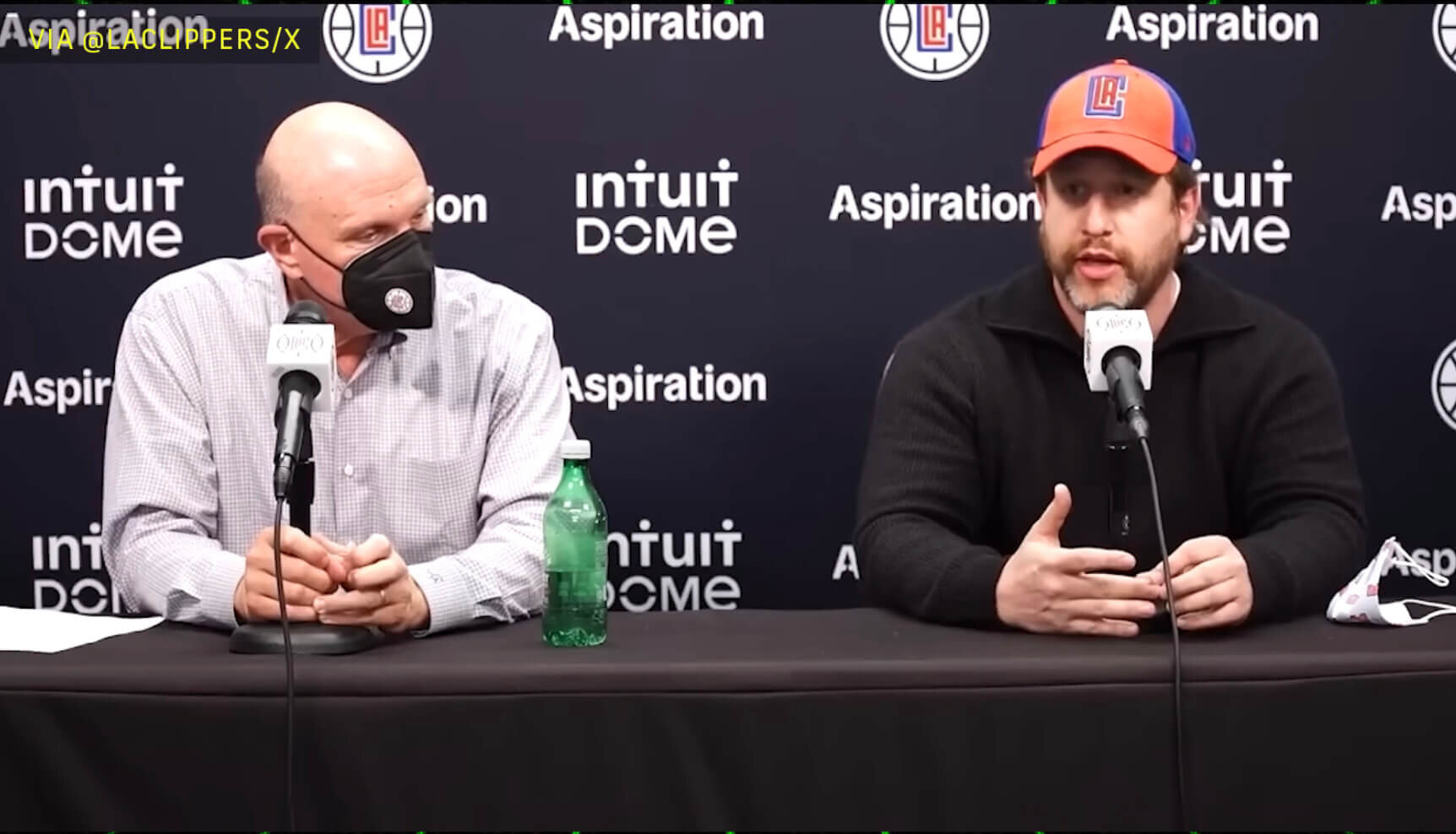The fraudster at the center of an NBA scandal once proclaimed ‘tzedek tzedek tirdof’
Before his fall from grace, Joe Sanberg was a Democratic Party up-and-comer who wanted to ‘automate tzedakah’

Joe Sanberg, right, with Steve Ballmer at a press conference announcing Aspiration’s partnership with the Los Angeles Clippers. Screenshot of X/LA Clippers
Joe Sanberg’s arrest earlier this year made relatively few headlines, considering he was running a $248 million fraud scheme.
That changed Wednesday when a sports investigations podcast identified Sanberg as the center of a shady endorsement scheme embroiling the Los Angeles Clippers and their star player, Kawhi Leonard. By the end of the day, the NBA had announced it was launching an investigation of the team.
The podcast, Pablo Torre Finds Out, reported that Sanberg’s now-defunct green energy company, Aspiration, agreed to a 4-year, $28 million endorsement contract with Leonard in 2021, right around the time he agreed to sign a playing contract with the Clippers that league observers described as not exorbitant and team-friendly. Financial documents, Sanberg’s emails and interviews with former Aspiration employees have fed speculation that Clippers owner and former Microsoft CEO Steve Ballmer funneled the money to Leonard to circumvent the NBA’s salary cap rules.
Sanberg pleaded guilty last month and now faces up to 40 years in prison. It was a steep fall for someone once seen as a rising star of the Democratic Party, and who often touted the Jewish imperative to do good.
So, who is Sanberg, and how did he come to be the linchpin of the NBA’s latest scandal?
A rising Democratic star
An entrepreneur, liberal activist and philanthropist, Sanberg grew his fortune first at Blackstone, the asset management behemoth, then as an early investor in Blue Apron, the meal kit company. He came to fame as an advocate for the California Earned Income Tax Credit, bankrolling a statewide publicity campaign to get the word out to low-income households the measure would help.
Sanberg centered his Jewish identity as he promoted that program and other anti-poverty measures. His passion for progressive causes, he told eJewishPhilanthropy, started with his bar mitzvah in Orange County, where he was raised by a single mom who was a schoolteacher. “My portion was Shoftim [Judges] — tzedek, tzedek, tirdof — justice, justice you shall pursue,” he said. His family had lost its house due to foreclosure when he was growing up, and tackling poverty was his pet issue.

His unusual blend of activism, rags-to-riches narrative and business credentials gave Sanberg status in the Democratic Party. He floated a run for president — yes, of the United States — in 2019, and mused about running for governor during the 2021 recall campaign against Gavin Newsom. Neither campaign materialized, but Sanberg remained influential, spearheading a failed ballot effort for an increased minimum wage last year.
Meanwhile, he put his values to work starting Aspiration, an “ethical banking” company that purported to fight climate change. His co-founder was another Jewish Democratic power player, Andrei Cherny. (Cherny stepped down in 2022 and was not charged in the case.)
Sanberg told the Jewish Journal in 2021 that the company was “inspired by the Jewish values that Andrei and I hold dear. It allows individuals to reconfigure your financial life so that you can automate Tzedekah into your daily routine.”
Among the company’s clientele were Meta, the social media behemoth, the Israel Philharmonic, the Jewish rapper Drake and the Los Angeles Clippers; the latter tapped Aspiration to offset the emissions from its new $2 billion arena. The company also agreed to offset a book about Israel written by Hasbara influencer Noa Tishby.
Aspiration itself was once valued at $2.3 billion.
How did it all go wrong for Sanberg?
Aspiration’s original iteration as an environmentally conscious banking company offered retirement accounts that invested in fossil-fuel-free companies and debit cards that provided carbon offsets for gas purchases. It had the backing of a slew of celebrities who doubled as endorsers — Leonardo DiCaprio; Robert Downey, Jr.; and Ballmer, the richest franchise owner in U.S. professional sports.
But the company’s growth slowed, and in 2021 Aspiration pivoted to a new business model — brokering carbon credits that were generated by planting trees.
According to the U.S. attorney’s office, Sanberg by then had begun a scheme to use his role as Aspiration’s co-founder and shares of company stock to defraud various lenders and investors through a series of 7-figure personal loans amounting to $145 million.
The Orange County Register, which read the affidavit, reported that Sanberg funded a tree planting service he claimed was funded by clients. The result, prosecutors said, was that Aspiration’s financial statements reflected much higher revenue than the company had actually received.
At one point, Sanberg claimed the company had more than $250 million in cash and assets when in reality it had less than $1 million in cash.
Where do the Clippers come in?
Ballmer had given Aspiration a major cash infusion in 2021. But he was also receiving money back from the company: Aspiration had a 23-year, $300 million sponsorship agreement with the Clippers, part of the team’s public relations campaign as it constructed a new arena in rapidly gentrifying Inglewood.
After its bankruptcy, some of Aspiration’s financial documents became public. Pablo Torre, an investigative journalist, discovered that a company associated with Kawhi Leonard, the Clippers’ star forward, was one of Aspiration’s creditors, to a tune of $7 million.
Torre obtained a copy of an endorsement deal Leonard signed with Aspiration, which required, ultimately, nothing from the athlete. Leonard is not known to have done any publicity for Aspiration.

He also unearthed emails from Sanberg that appeared to show a falling-out between him and Ballmer. Sanberg volunteered in one correspondence that Ballmer’s investment looked like a “sweetener,” though he denied it was.
The appearance, though, is that the endorsement deal was a “no-show” job for Leonard — a way to bump his take-home pay without factoring into the league’s salary cap.
The Clippers and Ballmer denied that there was any wrongdoing when Torre reached out. Sanberg did not respond when contacted through an attorney.
What happens now?
What comes next will be a major test of NBA Commissioner Adam Silver and a crossroads for Ballmer (both of whom are also Jewish). Silver has said in the past that circumventing the salary cap — the instrument by which the league ensures competitive parity between teams — is a serious offense. But Ballmer is also one of the league’s most powerful owners, and his ownership of the Clippers has transformed a moribund franchise into a perennial competitor.
An investigation that finds Ballmer and Leonard guilty of cheating would put a variety of punishments on the table: suspensions for Ballmer and Leonard, multimillion-dollar league fines, the termination of Leonard’s contract, the loss of draft picks and other restrictions.
Sanberg, meanwhile, is looking at hard time following his plea to two counts of wire fraud. The U.S. attorney was unsparing in its criticism of the disgraced liberal darling.
“This so-called ‘anti-poverty’ activist has admitted to being nothing more than a self-serving fraudster, by seeking to enrich himself by defrauding lenders and investors out of hundreds of millions of dollars,” Acting United States Attorney Bill Essayli said Aug. 21 in a statement. “I commend our law enforcement partners for their efforts in this case, and I urge the investing public to use caution and beware of wolves in sheep’s clothing.”
















